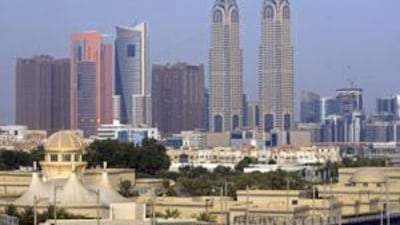ABU DHABI // Property investors in Dubai will be eligible for refunds or replacement property if they fall victim to unscrupulous or failing developers, under laws planned for this year. And developers will face new financial penalties if the buildings they promise are not delivered on time, or to agreed specifications.
Details of the proposed laws were revealed in a newsletter from the law firm Al Tamimi and Company, which ran a dialogue between Lisa Dale, the head of the firm's property practice, and Emad Eldin Farouq, a senior legal adviser at the Dubai Land Department. "There are lessons to be learnt from the crisis and we are emerging with a new legal regime," said Mr Farouq. "Loopholes in laws are being dealt with and things will become more organised in 2010."
As more buyers default on their payment plans and developers fail to deliver buildings on time, legal disputes are expected to remain a dominant theme in the UAE this year, lawyers say. "2010 is still the year of fighting," said Michael Lunjevich, the head of the property practice at Hadef and Partners. "It will be about consolidations, legal claims, liquidations and insolvencies. The market needs to clean itself out."
The most significant elements of the proposed legislation in Dubai relate to the protection of property investors, including the refund or replacement property for buyers where the developer delivers a defective property, and financial penalties for late delivery. The laws would also establish the grounds on which a purchaser can demand cancellation of the contract if, for instance, the developer refuses to link payment plans with construction milestones.
"The investor protection law is being proposed to deal with some specific issues identified last year, where investors needed further assistance in dealing with errant developers," Ms Dale said. Another element of the legislation would allow Emiratis with land granted to them by the Government to convert it to a freehold title, allowing them to sell it to another Emirati or GCC national, or mortgage the property, she said.
"The granted land system is a tradition in the UAE, enabling nationals to have access to lands for the purpose of building their home or business premises," Ms Dale said. "However, the system is quite limiting, as there are restrictions on transacting with such land. If you upgrade your title from granted to freehold, you can sell the property to other UAE or GCC nationals, or you can put it into a property fund or mortgage it. It becomes a much more flexible asset."
The Dubai Land Department also plans to begin regulating property valuers and conveyancers by requiring them to obtain licences, and to create a law to oversee property brokers who handle trust accounts for property deals, Ms Dale said. The department has created a draft law that would provide a regulated structure for establishing and managing property funds, which would "potentially provide a boost to the Dubai real estate market by generating an increased level of collective investment activity", she said.
Mr Farouq said in an interview yesterday that the Dubai Land Department was seeking to raise its number of lawyers to 15 from 10, and bring on board more property experts to help deal with the overflow of cases that have arisen from the slowdown in the property sector.
But the wider problem for clearing the system of legal disputes is the relatively uncertain nature of property legislation in Dubai.
Last year, the authorities announced Law No. 9 as a definitive system for determining what happens in the event of a buyer default, but the regulations spelling out the specifics of the law have yet to come out. Alexis Waller, the head of the property practice at Clyde and Company, said developers and investors in Dubai faced a "change-of-law risk". "You could do something today that could be impacted by a new law later," Ms Waller said. "We are operating in a jurisdiction where there are a lot of grey areas."
@Email:bhope@thenational.ae

